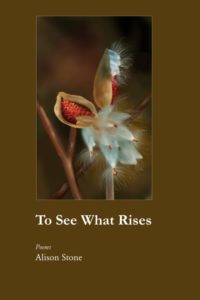 Review by Lisa C. Taylor
Review by Lisa C. Taylor
In this eighth collection by Alison Stone, the poet moves through the history of recent years, including the pandemic, protests, racial and economic inequities and their historical context. These are poems that do not avoid questions, even ones with no clear answer. The collection opens with a taut poem that covers pandemic denial, power disparity, and Jews turned away at Ellis Island. The poet asks, “What does it mean/to be American?” (13). This poem sets up a weaving of the past and present that runs throughout the collection. Death and politics intermingle. “…what rises/from the dark is no lost daughter/but a stranger, feral, smelling of moss…” (21)
There is an organic feel to the organization of the collection. Poems move from the loss of a friend to a barrage of news stories, to a sign from the dead, as in the poem, Rattling where she looks for, “a bulb’s flicker.” (25). Pandemic quarantine, missed time, and the juggling of online school and lost social time for kids, as well as the danger of everyday events like grocery shopping and getting mail serve as a reminders of this once-in-one-hundred-years pandemic and how it changed lives. In the poem, “Herd“, she compares the way the virus robs oxygen to Eric Garner’s plea, “I can’t breathe,” (39) In the poem, “What if I Admit I like It,” she addresses the positive effects of the pandemic such as families together for meals and quiet streets. Smog lessened as traffic slowed. Birds, animals, and flowers flourished, undisturbed by human activity. She marks seasons in a time when observation is a way of staying present amid catastrophic news reports and parental vigilance.
In the poem, “Because,” the poet’s daughter wants her to write a poem, “without love, death, naked people…” (31). The poem veers from injustice to saving dying worms, from mundane tasks to amazement. The messy moments of life are redeemed by simple observations. Perhaps the scars and brokenness allow the poet to stay present, “I believe/that love must be allowed in every crevice./it can find a way to enter//Because the dead do not come back” (52)
In the poem, “Why I Didn’t Report,” the speaker was violated in some way by a teacher and months later told her parents. They changed the subject but an aunt related how her mother had a similar violation in a darkened movie theater. When these experiences are dismissed, she learns “how the world will treat her body//and her words.” (59) The power of this poem lies in what the poet omits; the specifics of what happened, the age of the child or the mother. What is clear is the way it impacted their lives, making the body into something separate. The legacy of this story permeates this collection as in a later poem where the speaker does not force her child to kiss a disliked, dying uncle.
To See What Rises is a chronicle of aging, death, disease, and the loss of everything sacred. It is also about birds, bicycles, life-saving heart surgery, a damaged house that will be repaired, raising resilient kids, and the wonder of a new season. Greek mythology serves as inspiration for some of the poems highlighting familial relationships, creating distance from modern-day conflicts with parents, siblings, and children. It is an apt collection for these times; a jumble of Covid anxiety, conspiracy theories, and the tension of a high-stakes election with flashbacks of the insurrection. Alison Stone does not look away when people disappoint, whether in an extended family, or in the government. Violence makes an appearance in many poems, as it does in myriad headlines. Her poems for George Floyd, Kendrick Castillo, and the epidemic of gun violence are represented by the lines “One grief/flowing into the next. Children/sitting in classrooms. The next/gun shining somewhere, loaded.” (106)
To See What Rise is sobering and necessary. Alison Stone’s poems are not without celebration for small triumphs like the return of blossoms and the exuberance of a dog rolling in newly thawed grass. Her poems look directly at modern life in America, and this collection with its moments of reclamation is a chronicle of our times.
Alison Stone has published seven full-length poetry collections including Zombies at the Disco (Jacar Press, 2020), Caught in the Myth (NYQ Books, 2019), and Dazzle (Jacar Press, 2017). Her collection, They Sing at Midnight won the Many Mountains Moving Poetry Award. Her poems have appeared in The Paris Review, Ploughshares, Barrow Street, Poet Lore, and many other journals and anthologies, She has been awarded Poetry’s Frederick Bock Prize and New York Quarterly’s Madeline Sadin Award. She was a writer-in-residence at LitSpace, St. Pete. A licensed psychotherapist, she is also a painter and the creator of The Stone Tarot. www.stonepoetry.org
To See What Rises by Alison Stone
CW Books, 2023
$19.00 Paper ISBN: 978-1625494252
Lisa C. Taylor is the author of five collections of poetry, most recently, Interrogation of Morning (2022). She also has two published collections of short fiction. Her honors include the Hugo House New Works Fiction Award, Pushcart nominations in fiction and poetry, and fellowships from Tyrone Guthrie Centre in Ireland, Vermont Studio Center, and Willowtail Springs. Lisa publishes in both Ireland and the U.S. She teaches online for writers.com www.lisactaylor.com
